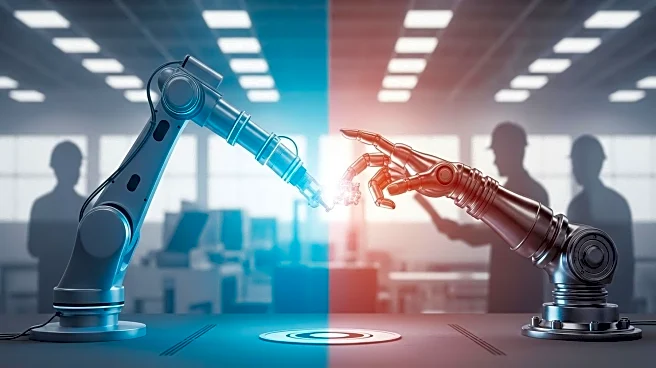What is the story about?
What's Happening?
IndustryWeek's latest review highlights several key developments in the manufacturing sector, focusing on the integration of artificial intelligence (AI) and the challenges posed by increased union activity. The review discusses how AI can enhance lean manufacturing processes, although it is not a standalone solution for transformation. It emphasizes the importance of a deliberate and testable framework for incorporating AI into lean practices. Additionally, the review addresses the growing concern among employers regarding union activity, with 38% of respondents in a Littler survey updating their labor relations strategies in the past two years. The review also touches on the role of foreign-born workers in maintaining and growing the U.S. workforce, highlighting the country's unique position among industrial powers.
Why It's Important?
The integration of AI into manufacturing processes represents a significant shift towards more efficient and innovative production methods. By enhancing lean practices, AI can potentially lead to increased productivity and reduced costs, benefiting manufacturers and consumers alike. The concern over union activity reflects broader labor market dynamics, where employers must adapt to changing workforce expectations and demands. This could lead to more robust labor relations strategies and potentially impact negotiations and workplace conditions. The reliance on foreign-born workers underscores the importance of immigration policies in sustaining the U.S. manufacturing workforce, which is crucial for economic growth and competitiveness.
What's Next?
Manufacturers are likely to continue exploring AI applications to optimize their operations, with a focus on creating frameworks that are both effective and adaptable. As union activity increases, companies may need to further refine their labor relations strategies to address worker concerns and prevent disruptions. Policymakers might also consider the implications of immigration on workforce sustainability, potentially influencing future legislation. The ongoing developments in these areas will require manufacturers to remain agile and responsive to both technological advancements and labor market shifts.
Beyond the Headlines
The integration of AI into manufacturing not only promises operational improvements but also raises ethical considerations regarding workforce displacement and the need for reskilling. As AI becomes more prevalent, manufacturers must address the potential impact on employment and ensure that workers are equipped with the necessary skills to thrive in an AI-enhanced environment. The increased union activity highlights the importance of balancing employer and employee interests, which could lead to more equitable workplace practices and improved job satisfaction.















